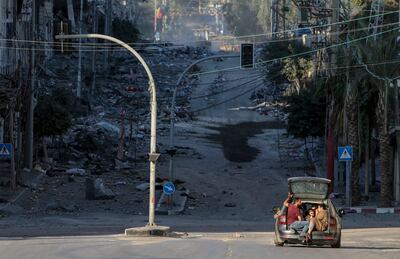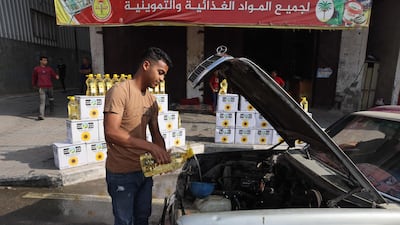Live updates: Follow the latest news on Israel-Gaza
Palestinians are resorting to desperate measures to survive as Israel's bombardment and economic blockade of the Gaza Strip puts intense strain on their ability to live and work.
Many Gazans have resorted to using “falafel fuel”, a nickname for the practice of mixing cooking oil with petrol to power vehicles, as Israel continues to prevent traditional fuel from reaching the enclave.
Palestinians told The National mixing fuel was the only way to power their cars, despite the potential damage it could cause to engines designed for petrol.
“I need to drive my car,” said Mohammed Baraka, 38, a taxi driver in Khan Younis. "I know this will affect the engine of my car and will shorten its lifespan.
“There is no fuel in Gaza and I need to use the car, as it is the only source of income for me.
“I am aware that this has bad effects but what we can do? We want to deal with the obstacles that we are facing to survive."
Mr Baraka told The National he’d never seen a situation as bad as the current one in his eight years as a taxi driver, which spans several conflicts between Israel and Hamas in Gaza.

The war has devastated Gaza's already fragile economy.
At least 400,000 people have been plunged into extreme poverty since the war began on October 7, the UN says, and an estimated 1.5 million of Gaza's 2.3 million people have been displaced.
Food, water and fuel supplies are all running low, despite some aid convoys entering Gaza through the Rafah border crossing from Egypt.
One litre of cooking oil costs 8 Israeli shekels (about $2) and will fuel most cars for a 13-kilometre journey, although road travel in much of the strip, where roads have been bombed or torn up by tanks, has become difficult even with a full tank.
“Since the beginning of the war I used to go to the petrol station to buy gasoline but with no result and if I succeed in finding one litre it will cost a lot,” said Sami AlBittar, another taxi driver from Khan Younis.
In Gaza, due to years of siege, border closures and war, residents have become adept at finding alternative ways to overcome challenges.
In 2007, Mr AlBittar also resorted to using cooking oil to drive when Israel imposed a siege on Gaza and prevented fuel from entering.
He mixed one litre of petrol with around 10 litres of cooking oil as petrol stations ran out of fuel and closed.

Doctors have warned that using cooking oil leads to higher levels of air pollution, adding another health risk to already fraught conditions for Gazans.
“Now most of the cars rely on cooking oil, which worsens air pollution that causes diseases and affects the environment and people's health, especially children whose bodies should not be exposed to such pollution,” said Dr Mohammed Kandel, of Nasser Hospital in Khan Younis.
Ola Hassan, 28, told The National she found the smell "suffocating" as she waited for a ride to the market, where she hoped to buy essential food. She fled northern Gaza to the south with only a backpack of supplies to support her whole family.
“I have been waiting for 30 minutes but I can’t find any taxi," she said. "The smell of cooking oil used by drivers is very suffocating and causes me severe fatigue as I have breathing problems."
The lack of fuel and dangerous conditions have led tens of thousands of internally displaced Palestinians to move on foot or rely on carts pulled by horses or donkeys for transport.
Hospitals are also suffering from the lack of fuel, with patients at risk as generators are shut off and leave wards without power.
The UN on Monday repeated its urgent call for more fuel to be allowed into the strip, warning it would need to shut down essential aid operations in Gaza within 48 hours if fuel was not delivered.
Israel has accused Hamas of stockpiling fuel to fight against Israeli troops, which the militant group denies.
At least 11,000 people have been killed in Gaza since October 7, with the real figure likely much higher.
Israel puts its death toll from the attack by Hamas on October 7 at 1,200, down from an initial estimate of 1,400.


